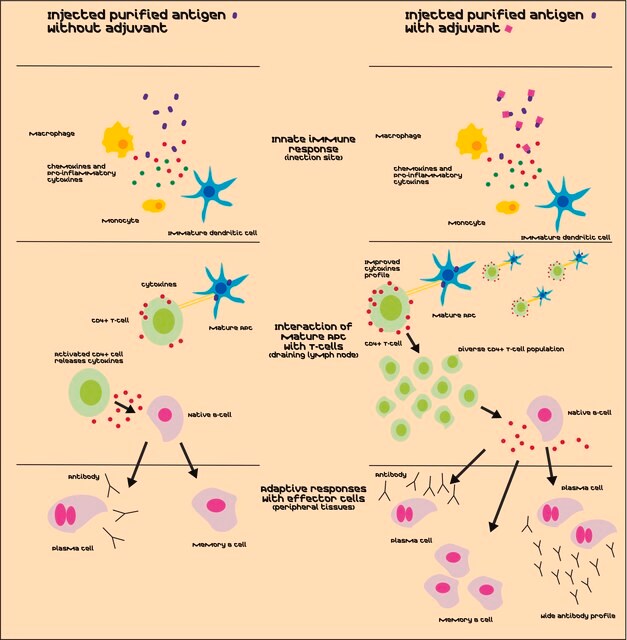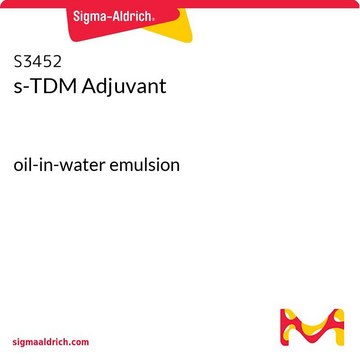H4397
TiterMax® Classic Adjuvant
liquid
Synonym(s):
Adjuvant System, TiterMax Adjuvant
Sign Into View Organizational & Contract Pricing
All Photos(1)
About This Item
UNSPSC Code:
12352203
NACRES:
NA.46
Recommended Products
General description
The effectiveness of an oil emulsion vaccine greatly depends on the form and stability of the emulsion. TiterMax Classic is a water-in-oil formulation with up to 90% water and a powerful adjuvant used in many protocols. TiterMax Classic Adjuvant contains three essential ingredients: a block copolymer, CRL89-41, squalene (a metabolizable oil) and a unique microparticulate stabilizer. The emulsion is less viscous and suitable for injection through small needles.
Application
For mice, four doses of 10 microl each into subcutaneous or muscular sites is recommended. TiterMax® was used in mice followed by isolation of CD4 T cells for epitope mapping and to test vaccines against Neisseria species.
TiterMax® Classic Adjuvant has been used to boost the production of antigen-specific polyclonal IgG in rabbits.
Biochem/physiol Actions
TiterMax Classic has been especially formulated with squalene to produce stable water-in-oil emulsions with up to 90% water. It is considerably easier to emulsify TiterMax Classic than Freund′s adjuvant. The resulting emulsion is less viscous, making it easier to inject through small needles.
Legal Information
TiterMax is a registered trademark of TiterMax USA, Inc
Disclaimer
Unless otherwise stated in our catalog or other company documentation accompanying the product(s), our products are intended for research use only and are not to be used for any other purpose, which includes but is not limited to, unauthorized commercial uses, in vitro diagnostic uses, ex vivo or in vivo therapeutic uses or any type of consumption or application to humans or animals.
Storage Class Code
10 - Combustible liquids
WGK
WGK 3
Flash Point(F)
Not applicable
Flash Point(C)
Not applicable
Personal Protective Equipment
dust mask type N95 (US), Eyeshields, Gloves
Choose from one of the most recent versions:
Already Own This Product?
Find documentation for the products that you have recently purchased in the Document Library.
Customers Also Viewed
A A Delvig et al.
Methods in molecular medicine, 66, 199-221 (2001-01-01)
Proteins with intrinsic mitogenic properties are widely represented in prokaryotes, such as in different Streptococcus species (1-3), Candida albicans (4), and Eikenella corrodens (5). Specifically, several bacterial porins of Escherichia coli, Shigella dysenteriae, Salmonella typhimurium, Fusobacterium nucleatum, and pathogenic Neisseria
Preclinical efficacy and immunogenicity assessment to show that a chimeric Plasmodium falciparum UB 05-09 antigen could be a malaria vaccine candidate
Dinga JN, et al.
Parasite Immunology, 40(3), e12514-e12514 (2018)
A A Delvig et al.
Methods in molecular medicine, 66, 349-360 (2001-01-01)
The majority of T cells recognize peptide epitopes bound to major histocompatibility complex (MHC)-encoded glycoproteins on the surface of professional antigen-presenting cells (APC), principally dendritic cells, macrophages, and B cells (1-3). Most T cells are specific for peptide epitopes in
Our team of scientists has experience in all areas of research including Life Science, Material Science, Chemical Synthesis, Chromatography, Analytical and many others.
Contact Technical Service









